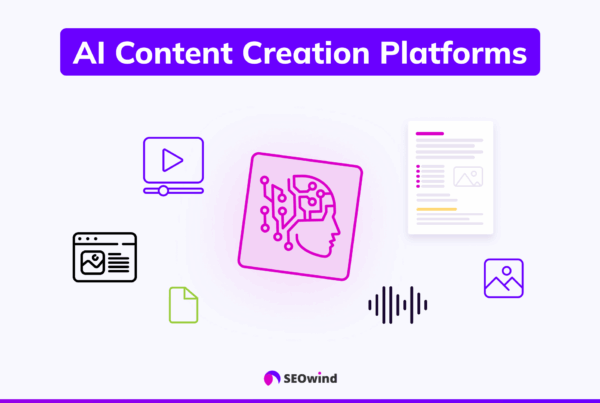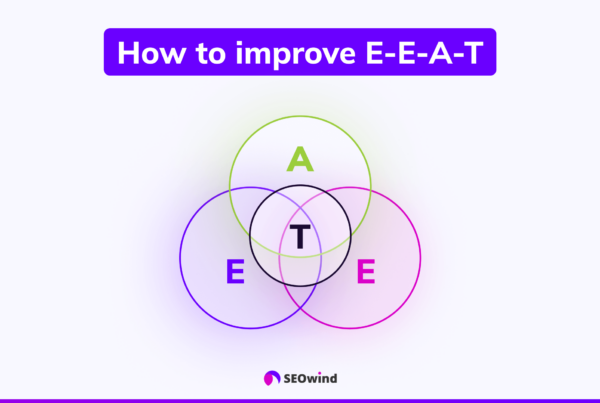Staying ahead of the curve is paramount for success. As we approach 2023, the importance of effective SEO keyword research has never been more significant. If you’re wondering how to do SEO keyword research, then you’ve come to the right place.
This comprehensive step-by-step guide will explore the fundamentals of conducting SEO keyword research, its importance, and how you can master it to fuel your content strategy, boost organic traffic, and outpace your competition. Let’s dive into the world of keyword research, unlocking the secrets to driving exceptional results and staying ahead in 2024.
Key Takeaways on SEO Keyword Research
- SEO keyword research is the process of identifying and analyzing specific words and phrases that users type into search engines when looking for information or products online.
- Thorough keyword research helps you understand your target audience’s language and preferences, create content that aligns with their needs and interests, enhance the visibility of your website in search engine results, and provide insights into emerging trends, potential opportunities, and gaps in the market.
- Keyword research is essential for driving relevant traffic, improving rankings, gaining competitive advantage, developing a content strategy, and making it cost-effective.
- Keyword research is needed when conducting SEO, fueling your content strategy, and making paid campaigns efficient.
- Keyword research is crucial when creating new content or updating existing content on your website or blog.
- The first step in conducting keyword research is to understand your target audience and their search intent.
- Keyword research is an ongoing process that requires regular updates and optimization.
- Incorporating keywords naturally and strategically throughout your website’s content is essential for optimizing your website for search engines and attracting more organic traffic.
- Keyword research tools can be used to analyze competition, backlinks, and related keywords.
- Refining your keyword list by removing irrelevant or low-performing keywords and focusing on high-potential ones is essential.
What is SEO Keyword Research?

SEO keyword research is the process of identifying and analyzing the specific words and phrases that users type into search engines, such as Google when looking for information or products online. These keywords are crucial in optimizing your website content to rank higher on search engine results pages (SERPs), attract more organic traffic, and ultimately convert visitors into customers.
Understanding the keyword phrases your target audience uses enables you to create highly relevant content that addresses their needs, questions, or pain points. By incorporating these keywords naturally and strategically throughout your website’s content, you effectively signal to search engines that your site offers valuable information related to those search queries.
In a nutshell, thorough keyword research:
- Helps you understand your target audience’s language and preferences
- Allows you to create content that aligns with their needs and interests
- Enhances the visibility of your website in search engine results
- Provides insights into emerging trends, potential opportunities, and gaps in the market
By mastering SEO keyword research, you can elevate your digital presence, outrank competitors, and drive consistent organic traffic to your website.
Is Keyword Research Important?
SEO keyword research is the foundation of a successful digital marketing strategy. It plays a critical role in helping you create content that effectively caters to your target audience and ranks well on search engine results pages. Here are some key reasons why keyword research is essential for your online success:
Drive Relevant Traffic
By identifying and targeting relevant keywords, you attract visitors who have a genuine interest in your content, products, or services. This targeted traffic results in higher engagement rates, longer dwell times, and ultimately, increased conversions.
Improve Rankings
Using the right keywords allows search engines to understand what your content is about, making it more likely to rank higher for those search terms. Higher rankings lead to greater visibility, which translates into more organic traffic.
Gain Competitive Advantage
Understanding the keywords your competitors are targeting gives you valuable insights into their strategies and potential opportunities for growth. By identifying gaps and capitalizing on them, you can gain an edge over your competition.
Develop Content Strategy
Keyword research helps you discover what topics are relevant to your audience, allowing you to plan and create content that resonates with them. This not only improves user experience but also increases the likelihood of social sharing and backlinks, further boosting your SEO efforts.
Make it Cost-Effective
Organic traffic generated through effective keyword research tends to be more cost-effective than paid advertising campaigns. By investing time and resources in SEO keyword research, you can drive sustainable long-term growth without relying solely on costly paid marketing methods.
SEO keyword research is crucial for understanding your audience’s needs, creating valuable content, outranking competitors, and driving organic traffic to your website. Ignoring this vital aspect of digital marketing can severely hinder your online success.
When do you need keyword research?

Keyword research is a versatile tool that serves various purposes in your digital marketing efforts. Here are three key scenarios when you need to conduct keyword research:
1: Keyword Research For SEO
Search engine optimization (SEO) is the process of improving your website’s visibility on search engine results pages (SERPs). Keyword research is integral to SEO, as it helps you identify the search terms your target audience uses to find content, products, or services similar to yours. By incorporating these keywords into your website content, you increase the likelihood of ranking higher on SERPs, driving more organic traffic, and ultimately converting visitors into customers.
2: Keyword research fuels your content strategy
Creating relevant, engaging, and high-quality content is essential for attracting and retaining visitors. Keyword research provides insights into the topics and questions that interest your audience, helping you plan and develop content that addresses their needs and preferences. By focusing on keywords with high search volume and low competition, you can create content that stands out in a crowded online space, generates organic traffic, and fosters user engagement.
3: Keyword research makes paid campaigns efficient
Paid advertising campaigns, such as Google Ads or social media ads, require effective keyword targeting to ensure your ads reach the right audience. Keyword research helps you identify the search terms your potential customers use, allowing you to create targeted ad campaigns that maximize return on investment (ROI). Additionally, understanding the cost per click (CPC) for specific keywords enables you to allocate your budget effectively and optimize your campaigns for better results.
Whether you’re optimizing your website for search engines, planning a content strategy, or running paid ad campaigns, keyword research is an indispensable tool that helps you make informed decisions and drive success in your digital marketing efforts.
4: Keyword research for writing new content and refreshing content
Keyword research is essential when you are creating new content or updating existing content on your website or blog. It is vital when you are planning to refresh your content or re-optimize it to stay relevant. Regularly updating your keyword strategy ensures that your content continues to cater to the evolving needs of your audience, while also adhering to the latest search engine algorithms and ranking factors.
Keyword Research Basics

Before we jump into how to do SEO keyword research, it’s crucial to understand the fundamental concepts and keyword metrics that influence your strategy. Here are six essential elements to consider during your keyword research process:
Average Monthly Search Volume
Monthly search volume (MSV) refers to the average number of times a specific keyword is searched for in a month. A high MSV indicates that a keyword is popular and has the potential to drive more traffic to your website. However, high search volume keywords often come with increased competition. Balancing high search volume keywords with less competitive terms can be an effective approach.
User Intent
User intent, also known as search intent, is the primary goal a user has when typing a query into a search engine. It’s essential to understand and align your content with user intent to increase engagement and conversions. User search intent can usually be categorized into four types: informational, navigational, transactional, and commercial investigation.
Relevancy
Relevancy refers to how closely a keyword aligns with your content, products, or services. Targeting highly relevant keywords ensures that you attract the right audience and provide them with valuable information that meets their needs or solves their problems.
Authority
Authority measures the credibility and trustworthiness of your website in the eyes of search engines. By targeting keywords within your niche and creating high-quality content, you can build authority over time. Websites with higher authority tend to rank higher on SERPs.
Long-Tail Keywords
Long-tail keywords are highly specific phrases consisting of three or more words. These keywords often have lower search volume but tend to be less competitive and have higher conversion rates due to their specificity. Incorporating long-tail keywords into your strategy can help you reach a more targeted audience.
Types of Search Query
Search queries can be classified into three main types based on their structure and specificity:
- Head terms: Short, broad keywords with high search volumes and competition (e.g., “shoes”).
- Body terms: Medium-length phrases with moderate search volumes and competition (e.g., “women’s running shoes”).
- Long-tail terms: Longer, more specific keywords and phrases with lower search volumes but higher conversion rates (e.g., “best women’s running shoes for flat feet”).
Understanding these keyword research basics will equip you with the knowledge and keyword tools necessary to conduct effective keyword research and optimize your website for search engines. By focusing on monthly search volume, user intent, relevancy, authority, long-tail keywords, and types of search queries, you can create a solid foundation for your SEO strategy and drive growth for your business.
How To Do SEO Keyword Research [Experts Insights]

Conducting keyword research involves a systematic approach that helps you discover, analyze, and choose the best keywords for your website. Here’s a step-by-step guide on how to do keyword research:
Step 1: How to Find Keyword Ideas
Embarking on the journey of keyword research begins with uncovering a treasure trove of potential keyword ideas that resonate with your target audience. By tapping into various sources and leveraging diverse techniques, you can generate a comprehensive list of keywords that lay the foundation for a robust SEO strategy. In this section, we’ll explore four effective methods for generating keyword ideas.
Brainstorming
Start with the seed keyword. Brainstorm a potential keyword list based on your niche, products, services, or target audience. Consider the common terms, phrases, or questions your audience might use when searching for information related to your business.

Brenton Thomas, CEO, Twibi
One efficient method to choose the right keywords for your content is to start by brainstorming a list of potential keywords that apply to your topic. You can then use a keyword research tool, such as Google AdWords’ Keyword Planner or SEMrush, to identify the search volume and competition level of each keyword on your list.
Select keywords that are both relevant to your content and have a good search volume, but not too high competition. It is important to keep in mind that the keywords you choose should match the intent behind the search queries that your target audience is using.
Finally, ensure you add long-tail keywords to your list. These are phrases or words that are specific to your niche or area that can help you rank higher in search engines while keeping competition low. A good mix of both long-tail and short-tail keywords will help you optimize your content for better search engine ranking.
Competitor Analysis
Analyze the websites of your competitors and identify their target keywords. This can provide valuable insights into their strategies and help you discover potential keyword opportunities you may have overlooked.
Watch this video to find out how to do keyword research on steroids by analyzing top-performing content.
Remember, competitor analysis is not about copying their tactics, but rather leveraging insights to inform and refine your keyword research strategy for sustainable growth.
Find out how to search for keywords on a website.

Gosia Hytry, Head of Content, Spacelift
The most efficient method for choosing the right keywords for content is to conduct competitor keyword research. It involves analyzing the keywords used by your competitors in their content and understanding their level of success with those keywords.
By examining what works well for them, you can identify new opportunities and optimize your content. Additionally, competitor keyword research can help you gain insight into which topics and keywords resonate with their target audience, allowing you to craft content that appeals to the same demographic.
Discover your content gap

Mashiat Maswood, SEO Strategist, Verb Interactive
Running a keyword gap analysis is the most efficient strategy for discovering keywords for your content. Usually, you would take your competitor site’s top 20 ranking keywords and then run an analysis for all three competitor sites along with your own, which will help you discover the gap. For the keyword gap analysis, you must look for non-branded keywords from your top three competitors. In doing so, you can easily find the most relevant keywords for your content.
Apart from this method, you can also use your primary keyword to discover the top three organic results. Once you’ve found them, run them in Ahref’s Site Explorer to find the high-search volume keywords. This enables you to combine the relevant keywords and create the best content.
Google Suggestions
Utilize Google’s autocomplete feature by typing in your seed keywords and observing the suggested queries. This can give you an idea of popular search terms related to your niche. Additionally, pay attention to the “People also ask” and “Related searches” sections on Google SERPs for more keyword ideas.
By incorporating long-tail keywords derived from Google Suggestions and addressing common user questions, you can enhance your content’s value. Keep in mind that search trends evolve over time, so it’s essential to stay updated by regularly revisiting Google Suggestions and adapting your keyword strategy accordingly.
Use Keyword Research Tools
Leverage various keyword research tools, such as SEOwind, Google Keyword Planner, Ubersuggest, Ahrefs, Google Search Console (GSC), or SEMrush, to generate a list of relevant keywords based on search volume, competition, and other metrics. Those tools can provide you with new keyword ideas.
In this video, you can find out how to find attractive keywords using GSC.
Pay Attention to Conversations Offline

Gresham Harkless Jr., Founder, Blue16 Media
One of the most effective, often underutilized, approaches to finding the correct keywords or phrases is to have offline conversations.
I think that paying attention to questions, phrases, or even sentences that potential clients are using provides a great foundation for researching keywords and opportunities that may not be apparent from the data.
Step 2: How to Analyze Keywords
Once you’ve compiled an extensive list of potential keyword ideas, the next crucial step is to analyze and evaluate them based on various factors that influence their effectiveness. This process allows you to narrow down your list to the most relevant, high-performing keywords that align with your goals and enhance your digital marketing efforts. In this section, we’ll explore three essential aspects of keyword analysis—search volume, search intent, and topic clusters—that will help you make informed decisions and develop a winning keyword strategy.
Search Volume
Examine the monthly search volume (MSV) of your identified keywords to gauge their popularity. Aim for a mix of high and low search volume keywords to balance competition and potential traffic.
Search Intent
Determine the user intent behind each keyword by analyzing the top-ranking pages for that query. Ensure that your content aligns with the user intent to increase engagement and conversions.

Vicki Mace, Digital Consultant, Insight Digital Copy
Validate Keywords by Checking Search Intent
Brainstorm to create a list of keywords based on the topics you want to write about. Put them into Google and see what types of content rank for those keywords. This information will help you decide if those keywords align with the right search intent.
Once you have decided on your keyword(s), look up their search volume, competition, and how they are trending. Use this information to prioritize or find the best keywords for your content.
Optional: Brainstorm synonyms of those words and check what types of content rank for those terms in Google. Where relevant, use these words in your content as well.
Topic Clusters
Organize your keywords into topic clusters – groups of closely related keywords that revolve around a central theme. This approach helps create comprehensive content that covers various aspects of a topic while improving your site’s overall SEO structure.

Joe Cowman, Head of SEO, FATJOE
Conduct a Full SERP Analysis
Search volume, keyword difficulty, competitive density, and cost-per-click are all great indicators for helping you compile a list of potential targets, but they should all be taken with a pinch of salt as they will always vary across different tools. The most important part of research is the intent behind the searcher’s query, and no metric can accurately provide this.
SEMRush rolled out a search intent metric not so long ago, but in my experience, this is a little inaccurate, especially for low-volume queries, and only tells half the story.
Once you’ve got a list of relevant keywords suited to your project, refine the targets further by analyzing the results for each keyword—there are content briefing tools that can help automate this process. Consider the quality of the competing content, the authority of the brands publishing it, and the relevance to your expertise.
Step 3: How to Choose Organic Keywords
Having analyzed and evaluated your list of potential keywords, the final step is to select the most suitable organic keywords that will drive your SEO strategy forward. The right keywords can propel your website to the top of search engine results pages, attract targeted traffic, and bolster your online presence.
Keyword Difficulty
Keyword difficulty is a metric that estimates how challenging it will be to rank for a specific term. Select a blend of low, medium, and high-difficulty keywords to optimize your chances of ranking well across different search queries.
Connect keywords to Your Objectives and Goals
Align your chosen keywords with your website’s objectives and goals. Prioritize keywords that are most likely to drive conversions, build brand awareness, or achieve other marketing objectives.
By following this step-by-step guide, you can conduct effective keyword research. This way empowers your digital marketing strategy, boosts organic traffic, and propels your website toward online success.
How to do AI-assisted keyword research?
If you’re doing AI-assisted keyword research, vheck whether you’re making these common mistakes!
Here’s the Misstep: Many simply ask AI platforms for keywords and take what’s given without a second thought.
DON’T
- Rely solely on AI instead of SEO tools
- Ignore keyword quality
- Overlook SEO metrics
- Stuff keywords
DO
- Use SEO tools powered by AI
- Use AI to understand search intent
- Use AI to organize existing research
- Ask AI to cluster your keywords – but feed it with data
- Use AI to expand keyword ideas but double-check them.
Swipe through the carousel below to learn more
Prioritize Low Hanging Fruit
In the context of SEO keyword research, the term “low-hanging fruit” refers to opportunities that are easy to seize and have the potential to deliver quick results. These are often keywords with relatively low competition and moderate-to-high search volume. Prioritizing low-hanging fruit can provide an immediate boost to your website’s traffic and conversions while requiring minimal effort. Here are some tips on how to identify and capitalize on these opportunities:
Identify Keywords with High Potential
Use keyword research tools to find terms with a favorable balance between search volume and competition. Look for keywords with moderate search volume and low difficulty scores, as they have a higher likelihood of ranking well on SERPs.
Analyze Competitor Gaps
Study your competitors’ websites and discover keywords they may have overlooked or not targeted effectively. Exploit these gaps by creating high-quality content around these keywords and capturing traffic that your competitors are missing.
Optimize Existing Content
Review your current website content and identify pages that rank on the second or third page of SERPs for specific keywords. Optimize content by improving on-page SEO factors such as title tags, meta descriptions, header tags, and keyword density. Enhancing existing content can lead to significant ranking improvements, driving more organic traffic to your website.
Focus on Long-Tail Keywords
Long-tail keywords are highly specific phrases that generally have lower search volume but higher conversion rates due to their specificity. Targeting long-tail keywords can help you reach a more targeted audience with minimal competition, resulting in faster ranking improvements.
By prioritizing low-hanging fruit in your keyword research strategy, you can quickly improve your website’s visibility on search engines, drive more organic traffic, and achieve tangible results with minimal effort. As you continue to invest in long-term SEO strategies, don’t forget to seize these easy wins along the way.
FAQs about How to Do SEO Keyword Research

Keyword research is a critical aspect of any digital marketing strategy. Here are some frequently asked questions to further enhance your understanding of SEO keyword research:
How do I know what keywords to target for my website?
To identify the best keywords for your website, follow these steps:
- Brainstorm a list of potential keywords based on your niche, products, or services.
- Analyze your competitor’s websites to discover the keywords they’re targeting.
- Use keyword research tools to generate relevant keyword ideas and gather data on search volume, competition, and keyword intent.
- Organize your keywords into topic clusters.
- Select a mix of high, medium, and low-difficulty keywords that align with your website’s objectives and goals.
How does keyword research relate to SEO?
Keyword research is an essential component of search engine optimization (SEO). It helps you identify the terms and phrases users type into search engines when looking for information related to your business. By incorporating these keywords into your website content, you signal to search engines that your site offers valuable information related to those queries. This increases the likelihood of ranking higher on search engine results pages (SERPs), driving more organic traffic and conversions.
How do I do SEO keyword research for free? Keyword research tool
Several free keyword research tools can help you conduct keyword research without breaking the bank. Some popular options include:
- Google’s Keyword Planner: A free tool within Google Ads that provides keyword ideas, search volume data, and competition metrics.
- Ubersuggest: A freemium tool that generates keyword suggestions, offers search volume data, and estimates keyword difficulty.
- Google Trends: This allows you to analyze the popularity of search terms over time and identify emerging trends.
- Google SERP features: Utilize Google’s autocomplete suggestions, “People also ask” section, and “Related searches” to find additional keyword ideas.
- Google Search Console – it’s a free website analytics software. GSC offers valuable insights into the keywords that already drive organic traffic to your website, revealing their search volumes, click-through rates, and average positions on SERPs. These insights can help you identify high-performing keywords, uncover new opportunities, and refine your SEO keyword research strategy to maximize visibility and user engagement.
What’s the best method of keyword research?
The best method of keyword research involves a combination of various techniques, including brainstorming, competitor analysis, using keyword research tools, and analyzing user intent. By following a systematic approach that covers multiple aspects of keyword discovery and analysis, you can develop an effective keyword strategy tailored to your business goals and objectives. Remember that no single method is universally superior; the key is to adapt and refine your approach based on your unique needs and circumstances.
How does keyword research relate to SEO?
Keyword research and search engine optimization (SEO) share a strong, symbiotic relationship. As the backbone of any successful SEO strategy, keyword research helps you identify and understand the terms and phrases users type into search engines when seeking information related to your niche, products, or services. By incorporating these keywords into your website content in a natural and strategic manner, you communicate to search engines that your site offers valuable, relevant information that addresses user queries.
Here are some ways in which keyword research influences SEO:
Improved Rankings
Optimizing your content with relevant keywords increases the likelihood that search engines will rank your website higher on search engine results pages (SERPs). Higher rankings lead to greater visibility, which ultimately translates into increased organic traffic.
User Experience
Understanding the keywords your target audience uses enables you to create content that caters to their needs and preferences. By aligning your content with user intent, you enhance the overall user experience on your website, encouraging visitors to stay longer and engage more with your content.
Site Structure and Internal Linking
Keyword research helps you organize your content into topic clusters or groups of closely related keywords. This approach not only simplifies content creation but also improves your site’s internal linking structure, making it easier for both users and search engine crawlers to navigate your site.
Content Strategy
Identifying relevant keywords allows you to plan and develop content that resonates with your target audience. This not only improves user engagement but also increases the likelihood of social sharing and backlinks, further strengthening your SEO efforts.
Keyword research plays a pivotal role in SEO by helping you understand user behavior, create valuable content, improve website visibility, and drive organic traffic. Ignoring keyword research can significantly hinder the effectiveness of your SEO strategy and limit your online success.



